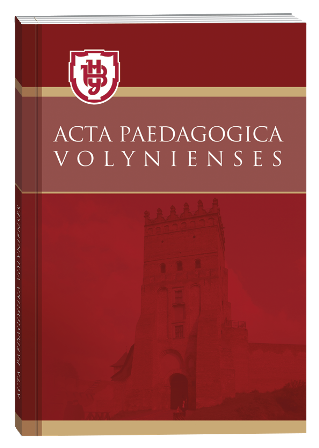COMMUNICATIVE ORGANIZATION OF EDUCATIONAL ACTIVITIES OF HIGHER EDUCATION STUDENTS
DOI:
https://doi.org/10.32782/apv/2025.1.27Keywords:
competence, competence, communicative organization of the student’s educational activity, principles of modular learning, project methodologyAbstract
The article states that it is important in the educational process of higher education institutions at the present stage to introduce, along with traditional ones, innovative approaches, forms and methods of learning aimed at high-quality assimilation of knowledge, skills and abilities by students, the development of their mental activity, stimulation of students’ creative activity, identification of skills and abilities for critical thinking, acquisition of experience in independent processing of educational material, search work, acquisition of qualities that will be useful in professional activity. The scientific investigation determined that the communicative principle of language learning actualizes the problem of linguistic communication, which is a necessary condition for the existence and development of culture, it ensures the unity of cultural processes in society: the creation, preservation and transmission of cultural values. All these processes are laid down in the course “Fundamentals of Scientific Research”, “Modern Ukrainian Literary Language”, “Ukrainian Language (for Professional Purposes)”, “Methodology of Teaching the Ukrainian Language”. Communicative activity is the link in which language as its symbolic system, teaching methodology and culture, in which language exists and acts as its necessary component, intersect and interact. Taking into account this connection allows us to prevent not only linguistic, but also cultural errors in speech communication. To substantiate this principle, the communicative personal organization of the applicant’s educational activity, which involves three conditions, was analyzed. The essence of the concepts of “competence”, “competence”, a clear distinction between these two terms was given. In the process of training applicants of the Faculty of Philology, the main tasks for studying various courses are to consider: theoretical issues of the modern Ukrainian literary language; conceptual foundations of grammar of modern Ukrainian literary language of higher philological education, the latest achievements of Ukrainian and foreign linguistics; analysis of key problems, controversial issues that contribute to the formation of scientific and linguistic thinking in future philologists.The scientific research indicates that the project methodology is aimed at creating a certain isolated final product, based on the students’ own experience. Therefore, one of the advantages of the project methodology of language teaching is the fact that it provides not only classroom, but also active independent, individual and distance work of students.
References
Великий тлумачний словник сучасної української мови / [Уклад. і головн. ред. В. Т. Бусел]. Київ, Ірпінь : ВТФ «Перун», 2002.
Дороз В. Ф. Методика викладання української мови у вищій школі : навч. пос. Київ : Центр учбової літератури, 2008. 176 с.
Застосування особистісно-розвивальних педагогічних технологій у підготовці майбутніх кваліфікованих робітників (методичні рекомендації для педагогічних працівників професійно-технічних навчальних освіти закладів, працівників науково-навчально-методичних центрів (кабінетів) професійнотехнічної МОН України) / М. В. Артюшина, Я. Ю. Білоконь, І. Б. Дремова, О. Б. Кошук, І. А. Мося, Т. М. Пащенко, Г. М. Романова ; за ред. Г. М. Романової. Київ : Ін-т проф.-тех. освіти НАПН України, 2014. 132 с.
Каніболоцька О.А. Інтерактивна методика у контексті комунікативного підходу до навчання іноземної мови у вищій школі. Наукові записки [Національного університету «Острозька академія»]. Сер. : Філологічна. 2013. Вип. 39. С. 263–265.
Нагаєв В. М. Методика викладання у вищій школі : навча. посіб. Київ : Центр навчальної літератури, 2007. 232 с.
Сігаєва Л. Є. Використання сучасних інформаційних технологій в освіті дорослих України. Сучасні інфор- маційні технології та інноваційні методики навчання в підготовці фахівців: методологія, теорія, досвід, проблеми. Київ – Вінниця. 2011. Вип. 28. С. 66–71.
Тарнопольський Б. Методика навчання іншомовної мовленнєвої діяльності у вищому мовному закладі освіти. Київ : Фірма «Інкос, 2006. 248 с.
Удовенко О. М. Інтерактивні методи навчання. Управління школою. Харків, 2004. № 34. С. 11–1 4.
Ягупов В., Свистун В. Компетентнісний підхід до підготовки фахівців у системі вищої освіти. Наукові записки. Том 71. Педагогічні, психологічні науки та соціальна робота. 2007. С. 3–8.







